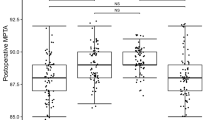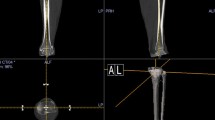Abstract
Purpose
It was our hypothesis that patient-specific instrumentation (PSI) can improve the accuracy of the rotational alignment in TKA based on the concept of the system and on the potential to clearly identify pre-operatively during planning the classical anatomical landmarks that serve as references to set-up the rotation both for the femur and tibia.
Materials and methods
In this prospective comparative randomized study, 40 patients (20 in each group) operated in our institution between September 2012 and January 2013 by the 2 senior authors were included. Randomization of patients into one of the two groups was done by the Hospital Informatics Department with the use of a systematic sampling method. All patients received the same cemented high-flex mobile bearing TKA. In the PSI group, implant position was compared to the planed position using previously validated dedicated software. The position of the implants (frontal and sagittal) was compared in the 2 groups on standard X-rays, and the rotational position was analysed on post-operative CT-scan.
Results
90 % of the patients add <2° or mm of difference between the planned position of the implants and the obtained position, except for the tibial rotation where the variations were much higher. Mean HKA was 179° (171–185) in the PSI group with 4 outliers (2 varus: 171° and 172°:184° and 185°) and 178.3° with 2 outliers (171° and 176°) in the control group. No difference was observed between the two groups concerning the frontal and sagittal position of the implants on the ML and AP X-rays. No significant difference of femoral rotation was observed between the two groups with a mean of 0.4° in the PSI group and 0.2° in the control group (p: n.s). Mean tibial rotation was 8° of internal rotation in the PSI group and 15° of internal rotation in the standard group (p: n.s).
Conclusion
Based on our results, we were unable to confirm our hypothesis as PSI cannot improve rotation in TKA. More work needs to be done to more clearly define the place of PSI in TKA, to keep on improving the accuracy of the system and to better define the individual targets in TKA in terms of frontal, sagittal and rotational positioning of the implant for each patient.
Level of evidence
Prospective comparative randomized study, Level II.


Similar content being viewed by others
References
Aglietti P, Sensi L, Cuomo L, Ciardullo A (2008) Rotational position of femoral and tibial components in TKA using the femoral transepicondylar axis. Clin Orthop Relat Res 466:2751–2755
Ahlbäck S (1968) Osteoarthrosis of the knee: a radiographic investigation. Acta Radiol Stockholm Suppl 277:7–72
Akagi M, Mori S, Nishimura S, Nishimura A, Asano T, Hamanishi C (2005) Variability of extraarticular tibial rotation references for total knee arthroplasty. Clin Orthop Rel Res. 436:172–176
Argenson JN, Parratte S, Ashour A, Komistek RD, Scuderi GR (2008) Patient-reported outcome correlates with knee function after a single-design mobile-bearing TKA. Clin Orthop Relat Res 466:2669–2676
Argenson JN, Parratte S, Ashour A, Saintmard B, Aubaniac JM (2012) The outcome of rotating-platform total knee arthroplasty with cement at a minimum of ten years of follow-up. J Bone Joint Surg Am 94:638–644
Argenson JN, Parratte S, Flecher X (2005) Minimally invasive total knee arthroplasty. Rev Chir Orthop 91:28–30
Barrack RL, Ruh EL, Williams BM, Foreman K, Nunley RM (2012) Patient specific cutting blocks are currently of no proven value. J Bone Joint Surg Br 94:95–99
Bäthis H, Perlick L, Tingart M, Lüring C, Zurakowski D, Grifka J (2004) Alignment in total knee arthroplasty. A comparison of computer-assisted surgery with the conventional technique. J Bone Joint Surg Br 86:682–687
Bedard M, Vince KG, Redfern J, Collen SR (2011) Internal rotation of the tibial component is frequent in stiff total knee arthroplasty. Clin Orthop Relat Res 469:2346–2355
Berhouet J, Beaufils P, Boisrenoult P, Frasca D, Pujol N (2011) Rotational positioning of the tibial tray in total knee arthroplasty: a CT evaluation. Orthop Traumatol Surg Res 97:699–704
Bonutti PM, Zywiel MG, Ulrich SD, McGrath MS, Mont MA (2010) Minimally invasive total knee arthroplasty: pitfalls and complications. Am J Orthop 39:480–484
Boonen B, Schotanus MG, Kort N (2012) Preliminary experience with the patient-specific templating total knee arthroplasty. 40 cases compared with a matched control group. Acta Orthop 83:387–393
Callaghan JJ, Wells CW, Liu SS, Goetz DD, Johnston RC (2010) Cemented rotating-platform total knee replacement a concise follow-up, at a minimum of twenty years, of a previous report. J Bone Joint Surg Am 92:1635–1639
Cheng T, Zhao S, Peng X, Zhang X (2012) Does computer-assisted surgery improve postoperative leg alignment and implant positioning following total knee arthroplasty? A meta-analysis of randomized controlled trials? Knee Surg Sports Traumatol Arthrosc 20:1307–1322
Cooke TD, Scudamore RA, Bryant JT, Sorbie C, Siu D, Fisher B (2012) A quantitative approach to radiography of the lower limb. Acta Orthop 83:387–393
Graw BP, Harris AH, Tripuraneni K, Giori NJ (2010) Rotational references for total knee arthroplasty tibial components change with level of resection. Clin Orthop Relat Res 468:2734–2738
Hafez MA, Chelule KL, Seedhom BB, Sherman KP (2006) Computer-assisted total knee arthroplasty using patient-specific templating. Clin Orthop Relat Res 444:184–192
Heyse TJ, Tibesku CO (2012) Improved femoral component rotation in TKA using patient-specific instrumentation. The Knee. [Epub ahead of print]. doi:10.1016/j.knee.2012.10.009
Huddleston JI, Scott RD, Wimberley DW (2005) Determination of neutral tibial rotational alignment in rotating platform TKA. Clin Orthop Rel Res 440:101–106
Iorio R, Bolle G, Conteduca F, Valeo L, Conteduca J, Mazza D, Ferretti A (2012) Accuracy of manual instrumentation of tibial cutting guide in total knee arthroplasty. Knee Surg Sports Traumatol Arthrosc. doi:10.1007/s00167-012-2005-7
Klatt BA, Goyal N, Austin MS, Hozack WJ (2008) Custom-fit total knee arthroplasty (OtisKnee) results in malalignment. J Arthroplasty 23:26–29
Laskin RS (2003) Instrumentation pitfalls: you just can’t go on autopilot! J Arthroplasty 18:18–22
Lemaire P, Pioletti DP, Meyer FM et al (1997) Tibial component positioning in total knee arthroplasty: bone coverage and extensor apparatus alignment. Knee Surg Sports Traumatol Arthrosc 5:251–257
Lustig S, Scholes CJ, Oussedik SI, Kinzel V, Coolican M, Parker DA (2013) Unsatisfactory accuracy as determined by computer navigation of VISIONAIRE patient-specific instrumentation for total knee arthroplasty. J Arthroplasty 28:469–473
Matziolis G, Krocker D, Weiss U, Tohtz S, Perka C (2007) A prospective, randomized study of computer-assisted and conventional total knee arthroplasty three-dimensional evaluation of implant alignment and rotation. J Bone Joint Surg Am 89:236–243
Noble JW Jr, Moore CA, Liu N (2012) The value of patient-matched instrumentation in total knee arthroplasty. J Arthroplasty 27:153–155
Novotny J, Gonzalez MH, Amirouche FM, Li YC (2001) Geometric analysis of potential error in using femoral intramedullary guides in total knee arthroplasty. J Arthroplasty 16:641–647
Nunley RM, Ellison BS, Ruh EL, Williams BM, Foreman K, Ford AD, Barrack RL (2012) Are patient-specific cutting blocks cost-effective for total knee arthroplasty? Clin Orthop Relat Res 470:889–894
Parratte S, Pagnano MW, Trousdale RT, Berry DJ (2010) Effect of postoperative mechanical axis alignment on the fifteen-year survival of modern, cemented total knee replacements. J Bone Joint Surg Am 92:2143–2149
Reed SC, Gollish J (1997) The accuracy of femoral intramedullary guides in total knee arthroplasty. J Arthroplasty 12:677–682
Nunley RM, Ellison BS, Zhu J, Ruh EL, Howell SM, Barrack RL (2012) Do patient-specific guides improve coronal alignment in total knee arthroplasty? Clin Orthop Relat Res 470:895–902
Schmitt J, Hauk C, Kienapfel H, Pfeiffer M, Efe T, Fuchs-Winkelmann S et al (2011) Navigation of total knee arthroplasty: rotation of components and clinical results in a prospectively randomized study. BMC Musculoskelet Disord 15:12–16
Scuderi GR (2006) Minimally invasive total knee arthroplasty: surgical technique. Am J Orthop 35:7–11
Slover JD, Rubash HE, Malchau H, Bosco JA (2012) Cost-effectiveness analysis of custom total knee cutting blocks. J Arthroplasty 27:180–185
Spencer BA, Mont MA, McGrath MS, Boyd B, Mitrick MF (2009) Initial experience with custom-fit total knee replacement: intra-operative events and long-leg coronal alignment. Int Orthop 33:1571–1575
Thienpont E (2012) Faster quadriceps recovery with the far medial subvastus approach in minimally invasive total knee arthroplasty. Knee Surg Sports Traumatol Arthrosc. doi:10.1007/s00167-012-2215-z
Victor J, Van Doninck D, Labey L, Innocenti B, Parizel PM, Bellemans J (2009) How precise can bony landmarks be determined on a CT scan of the knee? Knee 16:358–365
Author information
Authors and Affiliations
Corresponding author
Rights and permissions
About this article
Cite this article
Parratte, S., Blanc, G., Boussemart, T. et al. Rotation in total knee arthroplasty: no difference between patient-specific and conventional instrumentation. Knee Surg Sports Traumatol Arthrosc 21, 2213–2219 (2013). https://doi.org/10.1007/s00167-013-2623-8
Received:
Accepted:
Published:
Issue Date:
DOI: https://doi.org/10.1007/s00167-013-2623-8




